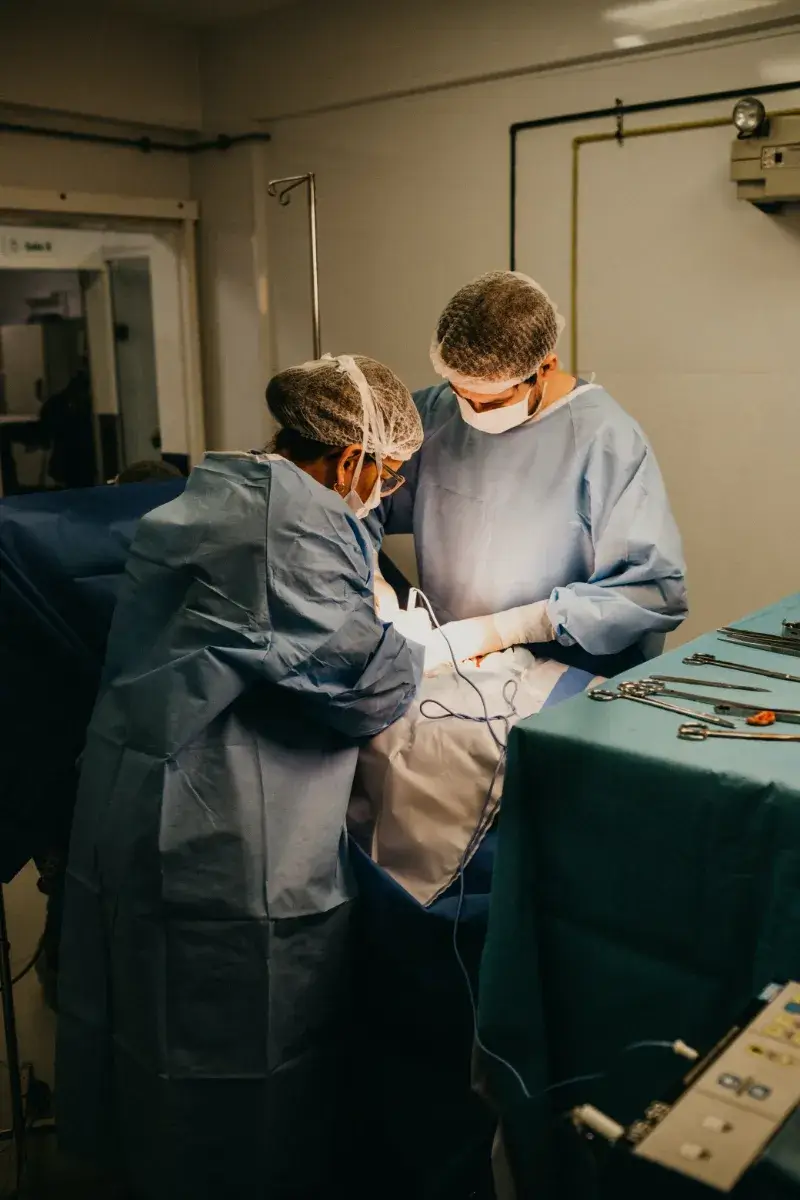Diagnosis & Treatment - Throat Cancers (Laryngeal and Pharyngeal Cancers)
Pharyngeal cancer treatment in Ahmedabad
Diagnosis
Before we begin the treatment, we will need to diagnose which type of throat cancer you have and the accurate stage of the cancer. This is a key step in developing the best treatment plan for you. We have in our team, expert pathologists and radiologists trained for head and neck cancers to help us in the diagnostic process.

Endoscopic (Rigid/Flexible) Examination and Throat Biopsy
Endoscopic examination helps to know the exact extent of the cancer and the sites that are involved by the cancer. A throat biopsy is the first step in diagnosing throat cancer. During the biopsy, Dr Supreet Bhatt will remove a small amount of abnormal tissue from the area where the cancer is suspected under endoscopic vision. The tissue sample is sent to the pathologist for diagnosis.
Imaging studies for Throat Cancer
As part of making a diagnosis, a radiologist takes special x-rays of your throat, such as CT scans, MRIs, or a PET scan (a whole body scan to know the sites involved and any chances of metastasis to distant sites)
These imaging tests provide more details about the stage and the spread of the throat cancer. The extensive knowledge of throat cancer allows Dr Supreet Bhatt to choose the imaging approach that’s best for you and to define the precise extent of the tumor.
HPV Testing for Throat Cancer
At Memorial Sloan Kettering, HPV testing is routine for many throat cancers. HPV-positive throat cancer has a better prognosis than other forms of the disease, so we may be able to offer you a less-intensive treatment plan that reduces your side effects without affecting your chances for a cure.
Treatment

A multimodality treatment is required to treat throat cancers including:
- Surgery to remove the cancer
- Radiation therapy and/ or chemotherapy to control or destroy the cancer
Which treatment or combination of treatments is right for you depends on the stage of the cancerand the sites involved.
- The main treatment for the cancer of Larynx and Hypopharynx is usually surgery. Sometimes radiation and chemotherapy are given after surgery to reduce the chances of relapse.
- Surgery, radiation, and chemotherapy are all common approaches for cancers of the oropharynx
Throat Cancer Surgery
Surgery is the treatment of choice for many people with throat cancer. You may be able to have a minimally invasive surgery in which the tumor is removed through your mouth or we may recommend a traditional open surgery to remove the cancer.
Transoral Robotic Surgery (TORS)
TORS is a minimally invasive surgery used to remove oropharyngeal cancer, including tonsil cancer. It combines three-dimensional imaging with tiny robotic surgical instruments. These tools us to access the tumor through your mouth. The approach does not require any external incisions. Recovery times are much faster than open surgery.
Transoral Laser Microsurgery (TLM)
TLM is a minimally invasive approach to remove throat cancers using a powerful microscope and LASER. TLM is used for early-stage laryngeal cancers and for oropharyngeal cancers.
During the procedure, a microscope is used to look down the throat in order to produce a magnified view of the larynx. We use a special laser beam at the tumor to remove it from the surrounding healthy tissue.
Open Surgical Approaches for Throat Cancer
Although a minimally invasive approach can be a good option for many people with throat cancer, it is neither right nor feasible for every patient with throat cancers.
Open surgery can be a particularly good option for people with large and complex tumors. Dr Supreet Bhatt is especially experienced at customizing treatment options to maximize the chances for a cure while at the same time preserving quality of life to the greatest extent possible.
People who have open surgery to remove a throat cancer may need plastic surgery to repair and restore the affected area. Reconstruction for throat cancer typically involves a microsurgical approach called free tissue transfer.
Laryngectomy
Some people with throat cancer may require a laryngectomy. This is an open surgery to remove a part or all of the laryngeal components.
Dr Supreet is an expert in performing Total Widefield Laryngectomies and Whenever appropropriate; partial laryngectomies. We use intricate surgical approaches to preserve as much of the larynx as possible. We use primary as well as secondary voice prosthetic devices for Speech generation.
Lymph Node Removal
If your tumor has spread or is likely to spread to your lymph nodes, we will need to remove the lymph nodes in your neck during your operation. The goal of lymphadenectomy is to remove the lymph nodes that have been shown to contain or are likely to contain cancer while minimizing complications. This reduces your chances of the cancer coming back.
Quality of Life after Throat Cancer Treatment
Quality-of-life considerations are a vital component of your care for throat cancers
Difficulty in swallowing is a common problem and many patients need a long standing feeding tube . Dr Supreet is very concerned about this problem. After careful attention to the swallowing therapy, a vast majority of our patients complete treatment without a feeding tube.
Speech problems are debilitating. Dr Supreet Bhatt has a special interest and expertise in voice prosthetic devices and electrolarynx placement makes it possible for the patient to cope up with the speech problems.
Speech and Swallow Therapy for Throat Cancer
The speech therapy experts will help you recover from any problems related to your ability to speak or swallow. They will be there for you before, during, and after your treatment to help address any problems regarding speech, swallowing, voice and mouth movements.
Know More
Know More
Know More
Know More
Know More
Specialization
Oral (Mouth) Cancers Tongue Cancers Throat Cancers (Laryngeal and Pharyngeal Cancers) Thyroid Tumors Parathyroid Tumors Nasal and Paranasal Sinus Cancers Anterior and Lateral Skull Base Cancers Salivary Gland TumorsContact Us






